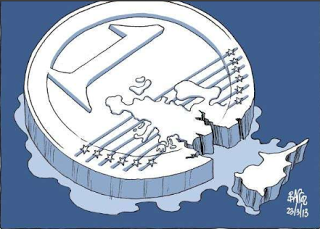(2 pm. – promoted by ek hornbeck)
Cross posted from The Stars Hollow Gazette
 As the dust of enthusiasm settles over this morning’s Cyprus deal with the European Union that closed the country’s second-largest bank and created a set of capital controls to prevent a run on the remaining banks, the financial world is taking a closer look and they aren’t happy. The agreement adheres to the law protecting insured accounts less than 100,000 euros. Supposedly, this deal prevented the immediate collapse of the Cyprus economy and its exit from the euro and, possibly, the European Union. Several economic analysts discuss the ramifications on the global banking and economy.
As the dust of enthusiasm settles over this morning’s Cyprus deal with the European Union that closed the country’s second-largest bank and created a set of capital controls to prevent a run on the remaining banks, the financial world is taking a closer look and they aren’t happy. The agreement adheres to the law protecting insured accounts less than 100,000 euros. Supposedly, this deal prevented the immediate collapse of the Cyprus economy and its exit from the euro and, possibly, the European Union. Several economic analysts discuss the ramifications on the global banking and economy.
The Prodigal Greek has the simplest explanation of what capital controls entail (h/t Yves Smith):
Here is what a cash economy looks like:
- Restrictions in daily withdrawals
- Ban on premature termination of time savings deposits
- Compulsory renewal of all time savings deposits upon maturity
- Conversion of current accounts to time deposits
- Ban or restrictions on non cash transactions
- Restrictions on use of debit, credit or prepaid debit cards
- Ban or restriction on cashing in checks
- Restrictions on domestic interbank transfers or transfers within the same bank
- Restrictions on the interactions/transactions of the public with credit institutions
- Restrictions on movements of capital, payments, transfers
- Any other measure which the Finance Minister or the Govern or of Cyprus Central Bank see necessary for reasons of public order and safety
In other words, Cyprus euros can only be spent in Cyprus and cannot be taken out of Cyprus to any other country; checks, debit and credit cards are useless. It is a strictly cash and carry local economy since Cypriots will not be able to make internet purchases. It will restrict travel into and out of the island, as well. The agreement has isolated the tiny island from the rest of the EU. Economics and financial analyst, Frances Coppola explains the ramifications of these restrictions:
From Tuesday, Cyprus becomes a black hole in the Eurozone: any money that goes into it stays there, and no money can leave……From a safe distance, it will appear frozen in time, a small cash-based economy, isolated from the rest of the EU. While inside, invisible to all except those who actually go there – or live there – its social fabric is torn apart as its economy collapses. Note the final clause in the capital control bill:
Any other measure which the Finance Minister or the Governor of Cyprus Central Bank see necessary for reasons of public order and safety
So as people’s livelihoods are destroyed and their standard of living crashes, other measures may be introduced to ensure that they can’t take matters into their own hands.
From Yves Smith at naked capitalism is her summation of the attempt to contain Cyprus:
First, confiscating bank deposits is now on the table in any future crisis. That’s toothpaste that’s not going back in the tube. Commerzbank chief economist Jörg Krämer has already suggested (Google translates) “a one-time property tax levy” for Italy and “a tax rate of 15 percent on financial assets.” And adding fuel to the fire, the Leader of the UK Independence Party has urged expats in the periphery countries, in particular the 750,000 British in Spain to “Get your money out of there while you’ve still got a chance.”
Second, capital controls in Cyprus mean that there are now two Euros in effect: The Euro that you can use only in Cyprus, and the Euro you can use elsewhere in the so-called “monetary union.” So from the perspective of people in Cyprus, the results are in some ways worst that a breakup: rather than having depreciated dough, you have dough that has been impounded, particularly in terms of using it outside Cyprus. [..]
Third, these concerns may be amplified by how rapidly and visibly the Cypriot economy craters. The “rapidly” is due to the fact, as discussed in greater detail in the post from Cyprus.com below, that the Cyprus economy will suffer a one-two punch: the loss of a big chunk of wealth, plus the disappearance of much of the financial services sector, which was 45% of GDP.
The capital controls have isolated Cyprus from the rest of the EU without actually expelling the country.
The deal may have stayed the immediate crisis but it hasn’t stopped the eventual collapse of the Cyprus economy or its future exit from the euro. Not only that, it is the shot across the bow for other economically troubled EU countries of things to come.

1 comments
Author